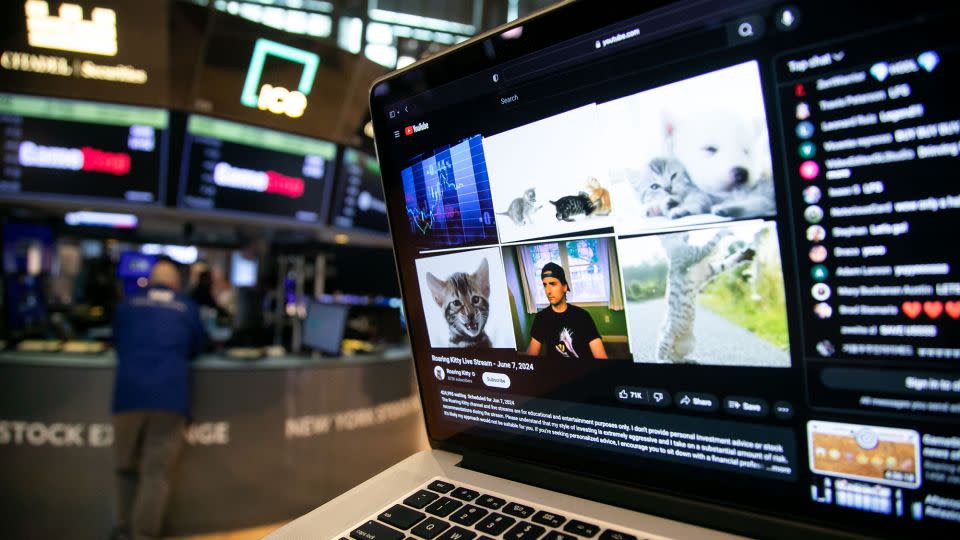Why this meme stock frenzy is different from 2021

A version of this story first appeared in CNN Business’ Before the Bell newsletter. Not a subscriber? You can sign up right here. You can listen to an audio version of the newsletter by clicking the same link.
Meme stock mania is back. This time around, it’s looking a little different.
Meme stocks saw a resurgence last month after Keith Gill, an investor who helped stoke the meme stock frenzy in 2021, made his first post on X in three years. Also known as “Roaring Kitty,” Gill has since posted screenshots on Reddit that appear to show GameStop shares and call options worth hundreds of millions of dollars in his portfolio, stoking excitement among his devout followers. (CNN has not independently confirmed the screenshots.)
GameStop shares have surged roughly 75% and seen wild, unpredictable swings since that first post. Gill’s fans last Friday flocked to his livestream, inundating the live chat with comments and questions. A video montage of kittens played before Gill himself finally appeared. The meme trader poured a beer during the stream and sported gaudy white sunglasses.
For many traders who experienced the original meme stock craze, the phenomenon has prompted a wave of deja vu. Still, there are key differences between the reignited 2024 meme stock craze and the original in 2021.
For one, trading volumes aren’t nearly as high as they were three years ago. Daily trading volumes of GameStop shares peaked at roughly 789 million on January 22, 2021, when the stock popped 51%, according to FactSet data. The highest trading volume for GameStop so far this year was on June 7, when roughly 279 million shares traded hands — and the stock tumbled 39%.
The difference in volumes could be due to the drastic changes in the economy, on Wall Street and in the world during the last few years. In 2021, people were stuck at home due to the Covid pandemic, using their stimulus checks to buy everything from exercise equipment to ingredients for baking bread to stocks. Interest rates were near zero, and the US economy was booming.
Now, interest rates are at a 23-year high. Persistent inflation is eating into Americans’ savings accounts. The economy remains resilient, but is showing signs of cooling as the Federal Reserve tries to bring down prices without triggering a recession. That has traders less willing to take on less investment risk compared to three years ago.
One thing that’s stayed the same? GameStop, along with other meme stocks, is still lacking when it comes to its balance sheet, says Craig Sarembock, a wealth advisor at Bartlett Wealth Management.
While GameStop shares have surged in recent weeks, it is still down 65% from its record high closing price in 2021. The video game retailer reported last Friday a loss of $32.3 million during the first quarter, slightly better than the $50.5 million loss the prior year. Sales slipped to $900 million from $1.2 billion the year before.
“Can you trade [meme stocks] and make money? Absolutely. You can do that with any stock. But for long term investors, that is just an area I would avoid wholeheartedly,” said Sarembock.
Why oil companies are raking in record profits under Joe Biden
Nearly four years ago, while campaigning in the runup to the last presidential election, Donald Trump warned that President Joe Biden would “destroy” the oil industry.
As Trump and Biden are set once again to face off in a presidential election, Trump has renewed claims that Biden’s agenda has hurt energy producers, promising to hit rewind on Biden’s environmental policies.
But the oil and gas industry in the United States has thrived under the current president, even as the Biden administration has touted its efforts to transition away from fossil fuels and towards green energy sources, reports my colleague Samantha Delouya.
In the last three and a half years, US oil production — and oil and gas company profits — have broken records.
The top five US-based oil and gas companies by market cap, according to S&P Global — ExxonMobil, Chevron, ConocoPhillips, EOG Resources and Schlumberger — have raked in more than $250 billion in profits between 2021 and 2023. That’s a 160% jump compared to the first three years of the pro-big-oil Trump administration, according to calculations by CNN.
The energy industry’s recent profit windfall underscores the limited influence of any US president — whether in favor of fossil fuel or not — in the global oil and gas market.
Elon Musk threatens to ban iPhones and Macs at his companies
Elon Musk is not happy about a new partnership between Apple and ChatGPT creator OpenAI, reports my colleague Hanna Ziady.
In a post to X on Monday, the Tesla chief executive said he would ban Apple devices at his companies — which include SpaceX and X, among others — if the iPhone maker went ahead with its AI plans announced Monday.
If Apple “integrates OpenAI at the (operating system) level,” Musk said that would constitute “an unacceptable security violation.”
He added that visitors “will have to check their Apple devices at the door, where they will be stored in a Faraday cage,” referring to an enclosure that blocks electromagnetic waves crucial to communications, including cellular, wireless internet and Bluetooth signals.
“Apple has no clue what’s actually going on once they hand your data over to OpenAI,” Musk said in a separate post. “They’re selling you down the river.”
Musk’s comments came hours after Apple unveiled the partnership with OpenAI at its annual Worldwide Developers Conference, part of a wider push to bring generative artificial intelligence tools to Apple products.
For more CNN news and newsletters create an account at CNN.com

 Yahoo Finance
Yahoo Finance 